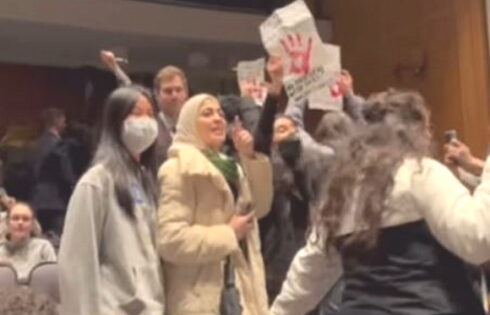
Put a target on his back by saying no evidence of racial bias in police shootings
One of the most baffling parts of #MeToo and #BelieveAllWomen culture is its indifference to “disparate impact,” one of the most important elements of progressive advocacy.
Who gets punished more in school? Black kids. Who is less likely to be hired based on their name? Black adults. Who is more likely to be roughed up by police? You get it.
Who is more likely to be accused of sexual misconduct in any sphere of society? Certainly not white guys. And precious few progressives are willing to call it out.
The white-dominated New York Times joins this selective parade of outrage by creating a deeply misleading portrait of sexual harassment allegations against a star professor at Harvard University, Roland Fryer, largely by crediting his white accusers over his nonwhite defenders.
Journalist Stuart Taylor, co-author of The Campus Rape Frenzy, tells the story in a meticulous investigation for RealClearInvestigations, covering both Harvard’s internal investigation and the Times‘ creative characterizations of it.
It’s important to note that Fryer, a MacArthur “Genius” recipient and still-young economist, runs the Harvard Education Innovation Laboratory (EdLabs), and his accusers are all subordinates. It’s also relevant that Fryer put a target on his back when he published research that found no racial bias in officer-involved shootings (even though he found strong bias in “lower-level uses of force”).
https://twitter.com/TheEconomist/status/592767322026311681
Even “accusers” is misleading. One person filed a complaint – Fryer’s personal assistant, a white woman, whose job performance he had repeatedly criticized before she accused him, according to Taylor:
Her sexual harassment allegations to Harvard came within hours after a meeting with her immediate supervisor, a representative of her union, and a Harvard human resources official, at which she had angrily rejected the supervisor’s explanation that her many mistakes on the job required a “performance management” plan.
Five days before that, she had also angrily rejected a severance package offered by Harvard as another option.
She wanted $25,000 more than Harvard was willing to offer, and she texted her friend Tanaya Devi – who remains Fryer’s loudest defender – that “I will do anything possible to make sure I get the money I deserve.”
Devi, by the way, is not mentioned at all in the New York Times article on Fryer, even though she says she spent “several hours” on the phone with one of the authors of the article.
She worked with Fryer for five years while pursuing her economics Ph.D. “and was an eyewitness to most of the joking episodes that gave rise to the sexual harassment allegations,” unlike the accuser’s white roommate, who was somehow deemed more credible by the white investigator, Taylor writes.
MORE: Fryer finds no racial bias in officer-involved shootings
The apparent problem is this dark-skinned Indian immigrant, who plans to leave America because of the stifling conformity of academia, contradicted the narrative the Times wanted to peddle:
While Fryer expected long hours of hard work and could be a “difficult person to work with” when displeased with subordinates’ work, Devi told me, she has never heard or seen him sexually harass or discriminate against a woman.
She added that the complainant, who was Fryer’s personal assistant with largely secretarial duties, was “my closest friend” and confidant until after she left EdLabs in anger in June 2017.
Devi could not recall “a single instance” when the complainant “expressed the slightest hint of discomfort” with the off-color tenor of some of the jokes and teasing by Fryer and others that were common in the lab.
The complainant and her lawyers also went scouting for other women, finding three female research assistants who said they felt uncomfortable when Fryer made a joke about one of them who “bent over” to help a professor tie his shoes.
Everyone laughed at the joke, but the investigator said they only laughed because of the “power dynamic,” since Fryer leads EdLabs. Hence, he sexually harassed them too.
Fryer’s main problem seems to be that he’s not white, unlike another manager who “was present for 90 percent of these conversations, including the shoe-tying episode and was totally exonerated,” as he said in the Harvard report.
His lawyer, Harvard Law Prof. Ronald Sullivan, says he was “constantly portrayed as an over-sexualized black man who no one could tell no” – one witness even complained about the “intensity of his look.” Sullivan also says Harvard ignored “rampant witness coaching” of the RAs by the accuser’s lawyers.
But Fryer is also not black enough to be seen as a victim of a white witch hunt. Another Ph.D. student, Alex Bell, says he lost points with black people for the “police shootings paper.”
Roland fryer, black Harvard professor who is often cited by Fox News to discredit #BlackLivesMatter, has been accused of sexual misconduct: https://t.co/09RTaatPoa pic.twitter.com/6SQq9WZye0
— The Root (@TheRoot) May 24, 2018
Accuser’s likely fabrications ignored by the newspaper of record
The New York Times went out of its way to mischaracterize the most relevant information from the 81-page Harvard internal report, which Taylor says was also leaked to him.
Most startlingly: that Harvard rejected 26 of the complainant’s 32 specific allegations, either because she made them up or they were not “unwelcome comments of a sexual nature.” The internal report found she “significantly overstated” and “broadly mischaracterized” Fryer’s conduct and “minimized her responses” – joining in the sexual banter or even suggesting it unprompted.
The worst allegation is likely a fabrication – that Fryer and a male staffer made graphic jokes about “sexual things” she was doing to a female supervisor, and discussed the supervisor’s “body parts.” Another witness to the conversation denied they said anything of the sort.
The first place it shows up in writing is the accuser’s text message exchange where she plots with her roommate – you know, another white person – on how to blackmail Fryer into giving her a good job reference. Weeks later she would formally accuse him of sexual harassment, right after that “performance management” meeting.
In another allegation denied by male and female eyewitnesses, the accuser claims Fryer used the word “pussy” in an angry exchange with her about “a long wait to get his car registered.” Taylor writes:
Even the Harvard investigator concluded that the complainant was probably not telling the truth in claiming that Fryer “frequently . . . talked about his testicles”; “insisted” that she “stay over in his bed” to help with a move while he was out of town; joked about her having sex with her roommate; and was alluding to the shape of her buttocks when he nicknamed her “Yoga.”
Freedom Rider: When Uncle Tom Falls
– Margaret Kimberley , BAR editor and senior columnist https://t.co/TcJAjkY17d
Black people should rejoice at the scandalous demise of Harvard-based traitor Roland Fryer, the darling of white supremacists. pic.twitter.com/55LMJlIP04— Black Agenda Report (@blkagendareport) May 30, 2018
What does the Times choose to focus on? There’s an ongoing investigation of Fryer by another woman, dug up by the first woman’s lawyers, who alleges sexual harassment from 2008 – described by the newspaper as “sexual overtures” by Fryer.
Actually, no one has ever alleged Fryer “ever made a pass at her or asked for sex,” and Fryer claims she only alerted Harvard weeks after he “told her that she was not doing well and put her on probation.” Another fired EdLabs employee, June Daniel, told the Times that Fryer made inappropriate comments about gays, minorities and everyone’s body parts, but the Harvard investigation rejected her similar allegations.
Why the Times doesn’t consider these job-related motivations to lie relevant to readers is beyond me.
The newspaper of record also left out Fryer’s claim that he saw the second woman’s email conversation with her mother “discussing (or perhaps fantasizing about) my death” in graphic detail. She left her laptop open on his conference table, Taylor writes.
Then there’s this blatant fabrication:
The Times said the [Office for Dispute Resolution] investigator had said EdLabs was “filled with sexual talk and bullying.” In fact, the report does not use the word “bullying,” or any variant, in describing Fryer’s conduct. It does not use “sexual talk” either. Nothing in the report suggests EdLabs was “filled” with either. I spoke to many former EdLabs employees and all of them said that there was a great deal of joking and teasing, but most of it was not sexual.
Just as Sullivan says that Harvard “weighted the credibility of white witnesses far above minority witnesses” and relied on “racial stereotypes,” so it appears does the New York Times when the subject is sexual misconduct.
MORE: NYT falsely claims college Trump supporters are calling for ‘safe spaces’
IMAGE: Osugi/Shutterstock
Like The College Fix on Facebook / Follow us on Twitter







Please join the conversation about our stories on Facebook, Twitter, Instagram, Reddit, MeWe, Rumble, Gab, Minds and Gettr.